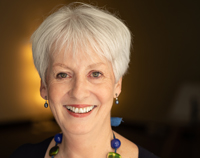04 April 2023
 Shirley Hicks is a Gold Coast counsellor and somatic psychotherapist (body oriented psychotherapy) and yoga teacher, based at Varsity Lakes on the Gold Coast. She is a Registered Clinical Psychotherapist, Clinical Mental Health Practitioner and a PACFA Clinical Supervisor. She is presenting the PACFA webinar, Yoga and the Traumatised Body, on 14 April (6:00pm to 8:00pm AEST).
Shirley Hicks is a Gold Coast counsellor and somatic psychotherapist (body oriented psychotherapy) and yoga teacher, based at Varsity Lakes on the Gold Coast. She is a Registered Clinical Psychotherapist, Clinical Mental Health Practitioner and a PACFA Clinical Supervisor. She is presenting the PACFA webinar, Yoga and the Traumatised Body, on 14 April (6:00pm to 8:00pm AEST).
You’re described as a ‘trauma-informed counsellor, somatic psychotherapist and yoga teacher.’ What does it mean to be ‘trauma-informed’ as a somatic psychotherapist/yoga teacher?
It means that you have an awareness of how traumatic experiences shape the nervous system. Trauma is biology, not personality. When engaging with everyone, but particularly survivors of trauma, a trauma-informed worker offers a new experience of safety, choice and effective action, collaboration and trust. We have the opportunity to re-awaken interoceptive awareness that is often disrupted as a result of nervous system overwhelm so that people can live in the world with a body versus despite their body (Bessel van der Kolk).
As a profession, are we getting closer to uniting the mind/body split?
My sense is that our opportunity as a profession is to awaken and open up clients to what is already there—it's not for us to unite the mind/body split—it's more about supporting clients rediscover their natural state of mind wisdom where the brain and the body interact. We might call it intuition, mind, wisdom. We need to be the catalysts of this process and not get in the way of that innate intelligence which never goes away but can be hard to trust and tap back into, particularly in the area of complex trauma.
Can you describe your journey to becoming a somatic psychotherapist/ yoga teacher? What inspired you to focus on somatic-based practice and therapy?
Prior to becoming a therapist, I practised as a Naturopath for a number of years. The wholistic approach to health has always felt intuitively correct to me versus the more reductionist view of an experience.
In my Naturopathic work, regardless of what dietary modifications or herbal medicines prescribed, attending to how people felt and thought about their world seemed a more important aspect of the work. This led me to what I now do today—working wholistically engaging both body and thought wisdom as a more wholistic approach to good health. In my own personal experience, I have found great support, comfort and insight through my own yoga practice and having a curious and engaged relationship with my system versus holding a view that physical and/or mental experiences I am having are separate to who I am as a person versus a reflection of how I am as a person.
For me, the most exciting conversation that each of us can have is the conversation with self.
What does your own somatic awareness bring to your practice as a therapist?
Bringing my body and my own quality of embodiment to my work with clients allows many of my clients who are disembodied due to trauma and interoceptive overwhelm, to be able to experience a responsive, calming and hopefully somewhat safe and attuned body that they can resonate with. Through this somatic resonance, clients are encouraged to dip back into their own somatic wisdom which can really expand their cognitive narrative and capacity to engage with the interoceptive narrative that never goes away but is sometimes not received as a result of the overwhelms of traumatic experiences.
It supports me as a therapist to have presence and resilience in the work so that clients have a relatively consistent and sustainable relationship with another for an extended period of time. This is an incredibly important aspect of trauma recovery work, given that trauma is born within the crucible of relationship.
For counsellors/psychotherapists trained in talk therapy modalities, what would you recommend for those wanting to bring greater somatic awareness into their practice?
Get to know your own somatic territory through developing curiosity in the signals and messages that your body is always sending—this might be through some form of physical engagement or exercise. Cultivatinga willingness to slow down and spend some time with yourself so that you widen your awareness of experience. Seek out training that inspires you to expand your capacity to be more embodied. This alone shifts the efficacy of talk-based modalities as you bring more of yourself to the therapeutic alliance. By knowing and listening to your own territory it develops authenticity and the capacity for co-regulation into the work.
You’re presenting a PACFA webinar, Yoga and the Traumatised Body, on 14 April (6:00pm to 8:00pm AEST), what can participants expect?
Participants will have the opportunity to experience a trauma-sensitive yoga practice (on their chair). I will present the key somatic trauma-informed principles that underpin the work, the latest research on how this practice facilitates the neurological recovery for trauma survivors and how this could be integrated into the repertoire of trauma informed interventions for therapists working with trauma survivors.
This workshop is very experiential as the learning happens more through the body's felt sense experience than purely the theory that can sometimes entirely miss the body. It is through a more embodied experience that this work can be best understood. Each participant will leave with at least one new piece of information that will be useful for their own personal use and potentially to share with clients.
Visit the
PACFA Events page to learn more about or to register for Shirley Hick’s presentation ‘Yoga and the Traumatised Body.’